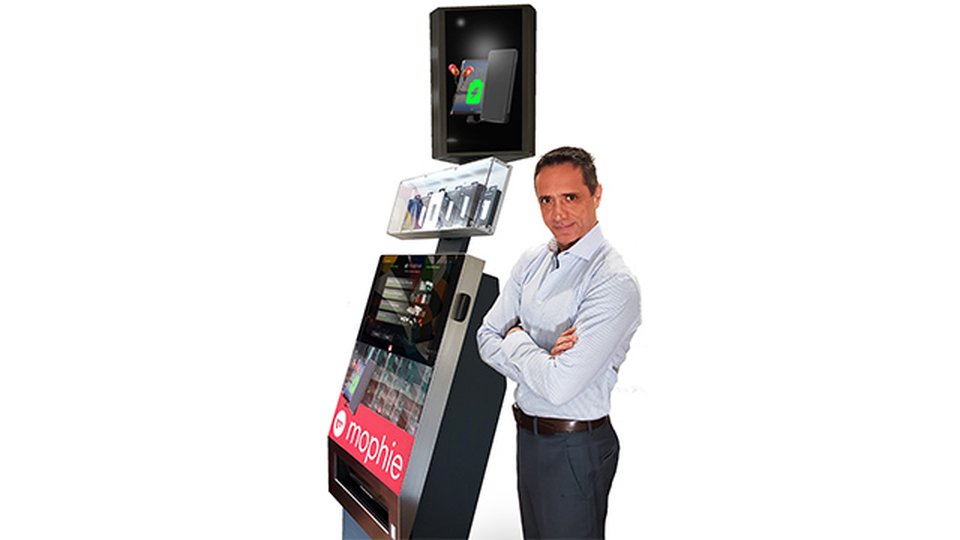Technology
Automated retail veteran develops small footprint kiosk for impulse sales
Kiosk veteran Eduardo Alvarez has developed a concept building and operating small footprint kiosks in high traffic locations that do not typically have a lot of retail stores, such as transportation terminals.

June 12, 2020 by Elliot Maras — Editor, Kiosk Marketplace & Vending Times
Everyone is anxious for stores and businesses to reopen after months of COVID-19. Eduardo Alvarez, a long-time veteran of automated retailing, is especially anxious. A self-service concept he has spent years developing for selling consumer products is in the final stages of production.
Alvarez believes consumers are more accepting of self-service than ever. In the past year, he has put his experience with Best Buy Express and other consumer brands to use developing small footprint kiosks for impulse purchases.
His company, MagNet Analytics Inc., builds and operates small footprint kiosks in high traffic locations that do not typically have a lot of retail stores, such as transportation terminals.
Prior to launching his MagNet Analytics, Alvarez developed and marketed retail kiosks for brands such as Best Buy Express, Estee Lauder, Duracell, Rite Aid, Qantas Airlines and Coinstar.
A strong retail brands background
A native of Mexico City, Alvarez began his career marketing consumer products to retailers. He also managed construction projects for a family business before earning an MBA with a technology focus at the Massachusetts Institute of Technology in 2000.
"There were no retailers that were convenient," he noticed living in downtown Boston while working on his MBA. "You would always have to take a card and go to the suburbs to the big box stores. Otherwise, you would not get a good deal."
He saw kiosks as a way for a consumer brand to reach more customers in busy urban environments, and he reasoned that the brands would recognize this as well and become willing partners. In 2006, Alvarez launched his own technology company, Vigix Inc., to develop a kiosk to dispense consumer products.
The business model was simple. Vigix designed kiosks for brands, outsourcing the manufacturing to Flextronics. Vigix then provided the software to brands on a subscription basis and managed a network of contractors to service the kiosks.
"We were selling the solution to brands," Alvarez said.
Brands come on board
Brands were quick to recognize the potential benefits Alvarez was offering.
In 2008, Australia's Qantas Airlines sold RFID tags in Vigix kiosks for touchless check-in at airports.
Swatch sold watches in airport kiosks. Motorola sold mobile phones and parts for prepaid phone charging cards. Sony Electronics sold movies in supermarkets. Procter & Gamble Co. sold Duracell batteries in pharmacies. Estee Lauder sold perfumes and coupons in stores. Rite Aid and Coinstar dispensed coupons and samples. Richline, owned by Berkshire Hathaway Co., sold precious metals in convention centers and at investor events.
But despite such high profile partners, none of the projects scaled to what Alvarez believed was their full potential.
Partnerships provide a learning experience
"I was frustrated with the idea that someone that had no experience in kiosks would take over the operations," he said. "In many cases that was one of the reasons it was limited in terms of growth."
"We were often faced with situations where people with no idea of the implications of the operation or the technology were making critical decisions that would make or break the content," he said. "That was often the reason why a lot of these projects did not scale."
In the case of Duracell, for example, instead of focusing on the top selling SKUs, the brand decision maker wanted all SKUs in the kiosk.
"A small footprint kiosk is not ideal for that type of offering," Alvarez said. "You have to offer just the top sellers in convenient locations. Kiosks are all about convenience, not presenting an array of options."
Even though he explained that to the decision maker, his advice wasn't heeded, and the operation became more complex to manage that was necessary. "A lot of resources got distracted," he said.
Automated retail is a specialty
While the concept of a retail kiosk seems simple, Alvarez realized that retail kiosks have unique requirements for merchandising, servicing and business operations.
"Automated retail is very specialized," he said. "It's very tricky, and it depends on a million details around not only the technology, but also the marketing aspects. Everything is integrated — everything affects everything."
"Expecting brands to own the decisions around operation and marketing of the kiosks was not, in my opinion, a good idea," he said. "That's why I created MagNet to be the owner and operator of the kiosks as well."
He believed that the company needed to not only provide the technology, but provide the service to the location, to have full ownership of the brand. He believes this arrangement was critical to Redbox's success.
"Redbox is a success story; they deployed around 40,000 locations in the U.S.," he said. "They were in charge of every single detail of the experience of the customer."
Part two in this two-part series will explore how Alvarez put his lessons to use to develop a business model for a retail kiosk business.
About Elliot Maras
Elliot Maras is the editor of Kiosk Marketplace and Vending Times. He brings three decades covering unattended retail and commercial foodservice.
 ChatGPT
ChatGPT Grok
Grok Perplexity
Perplexity Claude
Claude




